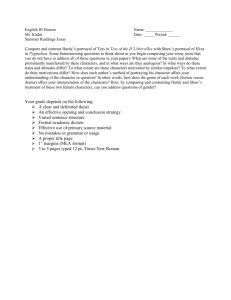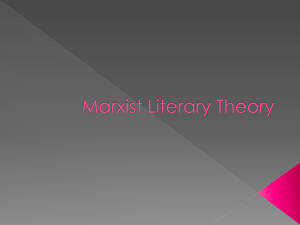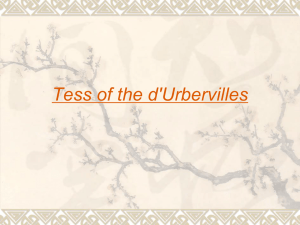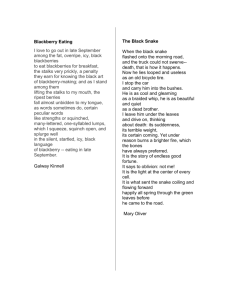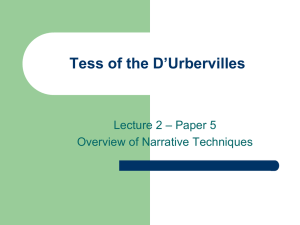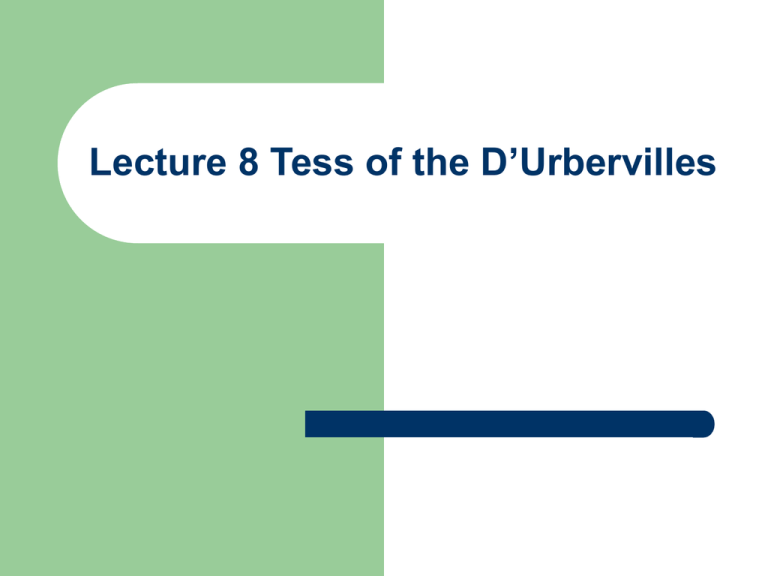
Lecture 8 Tess of the D’Urbervilles
Tess
A Pure Woman
Faithfully presented by Thomas Hardy
‘…Poor wounded name! My bosom as a bed
Shall lodge thee.’
– Shakespeare
Hardy asks his readers not to blame Tess too
much
And to believe in her innocence
All his ‘arguments’ bend toward a single
theme
Tess is a pure woman
Analytical Commentary as opposed to
Narrative Commentary
All these young souls were passengers in the
Durbeyfield ship—entirely dependent on the
judgment of the two Durbeyfield adults for their
pleasures, their necessities, their health, even their
existence.
Narrative Commentary re- syntax
Simply narrates / tells what the sentence means.
Analytical Commentary
Analyzes insightfully what does this sentence do.
By examining how the form and structure
emphasizes meaning to achieve intended effect.
Textual Analysis and Textual Evidence
For instance, we can look for evidence of gender
issues in the text of the novel
We can only discuss what is actually in the text
Avoid making unsupported assumptions
Do not say, Tess is like this because she is a woman
Only make the deduction if there is textual evidence
Avoid analyzing the history of Hardy’s life and the
history of Victorian culture, rather than the narrated
fictional world of his novel
Base all insights on analysis of the text itself
Lecture Focus
Latinate Diction
Central Concerns revisited
Commentary on the character of Tess:
How she is represented in Phase the Third
The metaphor of the ‘Ache of Modernism’ and Tess
Tess a creature of Nature
And the Symbolical Suggestiveness of the Sun
The narrator’s commentary, and voice
The force of these passages
Latinate Diction
Sensuous appeal in the quality of Latinate words;
the fullness and richness of the vowels;
the force and strength of the consonants
the elevated effect suits the dignity and importance
of the subject-matter of the novel
Suited to the metaphysical nature of its themes:
nature of love; conflict of the heart; good and evil;
and especially tragedy; < weightier > < solemn >.
Latinate style is associated with education and
sophistication; more < esoteric >
< learned >
Must seize upon some strain or strand
in the work of art that is actually there
The theme of feminine premarital sex
The crucial and crude issue of female virginity
The injustice of the taboo of chastity and virginity
The novel’s unmasking of the destructiveness of the
taboo of virginity
The irrational worship of female virginity;
(which has not vanished from human culture)
The struggles of sexuality within Nature and
Civilization
Life is much sadder and tragic than it should be.
Ch19 Would you like to take up any
course of study—history? ‘I don’t want
to know anything more…’ ‘Why not?’
Because what’s the use of learning that I am
one of a long row only—finding out that there
is set down in some old book somebody just
like me, and to know that I shall only act her
part; making me sad, that’s all. The best is
not to remember that your nature and past
doings have been just like thousands’ and
thousands’, and that your coming life and
doings ’ll be like thousands’ and thousands’.
From Chapter 19
‘What, really, then, you don’t want to learn
anything?’
‘I shouldn’t mind learning why—why the sun
do shine on the just and the unjust alike,’
she answered,
with a
slight quaver
in her voice.
‘But
that’s what books will not tell me.’
Note the narrator’s commentary
‘Tess, fie for such
bitterness!’
Of course he spoke with a conventional
sense of duty only,
for that sort of
wondering had not been unknown to himself
in bygone days. And as he looked at the
unpracticed mouth and lips, he thought that
such a daughter of the soil could only have
caught up the sentiment
by rote.
Commentary
In this interchange Tess is challenging Angel
not to let her life play out to nothingness.
She also compares herself to “the poor
Queen of Sheba in the Bible, thus showing
her learning while telling Angel she feels
impoverished next to his wealth of reading.
This is followed by a hint that there is never
enough good men to match the number of
women:
“more ladies
than lords”
Hardy as narrator then provides an
encompassing comment on her life
By offering his own perspective of the
potential relation between
unfortunate bodily experiences, < and >
the development of intelligence
“…experience is as to intensity,
and
not as
to duration”:
Note the antithetical structure and
natural imagery
‘Tess’s passing corporeal blight had been
her mental harvest.’
Commentary:
She has a more developed mind by now,
capable of historic speculation
It is more personalized and more complex
than her earlier fantasy concerning blighted
planets.
‘The Ache of Modernism’ aches Tess;
and Pessimism
[Chapter 19
Hardy as narrator further suggestively comments
that she is expressing in her own way
“the ache of modernism”
In this famous metaphor
[Image]
He combines a sharp bodily feeling [the Ache]
with a broad cultural meaning
[Modernism]
There appears to be some quality all along in Tess’s
life that reaches beyond any local meaning within
her immediate surroundings.
But does Angel appreciate her thinking?
What is the force of these passages?
They compel the reader to experience and
empathize with what Tess is going through
In a more personal, and painful way
And make you want so much that her life will
not be wasted; end up as a wasted life
That her life will be one of fulfillment, and
future happiness.
Moving on: In Chapter 20 we read
She looked ghostly, as if she were merely a soul at
large…
It was then, as has been said, that she impressed
him most deeply. She was no longer the milkmaid,
but a visionary essence of woman—a whole sex
condensed into one typical form. He called her
Artemis, Demeter, and other fanciful names half
teasingly, which she did not like because she did not
understand them.
‘Call me Tess,’ she would say askance; and he did.
Seeing Tess another way,
through another kind of imagery
Clare is in love but retains what is typical about his
character.
‘She looked ghostly, as if she were a soul at large.’
A non-physical spiritualized essence
This vision arises from the vestiges of Angel’s
religious upbringing.
In Angel’s eyes, Tess loses her physical / bodily
dimension and takes on a spiritual dimension
Classical allusions
During such spiritualized encounters
Clare tries to name her with chaste feminine titles
from ancient Greek mythology
Such as Artemis and Demeter
Showing how he so easily confounds / mixes up his
pagan Hellenism
with surviving elements of his acetic Christianity.
Tess no Goddess
The passage then changes direction quite decisively:
‘Call me Tess.’
Effect?
In an instant, Tess becomes erotic and natural
rather than
exotic and spiritual.
She is a woman of the earthly soil
not a Goddess of the heavenly sky.
Tess is inescapably flesh and blood.
And when the sun comes up, she is once again a
physical milkmaid, not a divine essence
“her teeth, lips and eyes scintillated in the
sunbeams, and she was again the dazzlingly fair
dairymaid only.
Soon after, we hear from the dairyman the story of a
seduction of a young girl.
“none of them but herself seemed to see the sorrow
of it”
And immediately, we read, “the evening sun was
now ugly to her, like a great inflamed wound in the
sky”
Sex as a natural instinct can also lead to misery
The Sun and the Symbolism of Light
When we first see Tess with the other girls at the
May Day dance
We must recall: They are all bathed in sunshine.
They are represented as creatures of the sun,
warmed and nourished by its natural power of
sustaining life, both human and terrestrial.
At Talbothays Dairy, we are compelled to notice the
sun is at its most active.
Suggestively reinforcing her association with Nature
The Symbolical Suggestiveness of—
the pre- Dawn Time of Day?
Tess and Angel rise very early,
before
the sun
They seem to themselves “the first persons
up
of all the world.”
The light is still “half-compounded, aqueous”
As though the business of creating animated
forms of life has not yet begun
They are compared to Adam and Eve
We notice when Tess is getting involved with
the superior power of a male character
The atmosphere is represented as misty…
On this occasion, it is a cold mist,
the sunless fog, which precedes the dawn
It is in this particular light of a cool, “aqueous”
whiteness, Tess appears to Angel as a
“visionary essence of woman”
Sunday
< and >
Sun day
The hot weather of July…
Hot steaming rains fell frequently…
The sexual atmosphere gets more dense,
and more intense
Which cause a flood, blocking the women’s way to
church on
a primal
“Sun’s-day”
A day “when the flesh went forth to coquette with
flesh while hypocritically affecting the business with
spiritual things”
[Implied Comment on Christian Church Culture?]
After the long chapter on their deepening
relationship
The narrative of their attraction-within-nature
Cumulates rapidly and forcefully through four
shorter chapters (20 – 23), to the end of this
Phase where Angel embraces Tess
And Angel tells Tess how he loves her
Interpretative Analysis:
The “resistless tendency” is toward a
sexual union within Nature
Whereby Hardy as narrator-commentator
comments on the seriousness of such a
juncture in the lives of two people:
“something had occurred which changed the
pivot of the universe for their two natures…
[something] based upon a more stubborn
and resistless tendency than a whole heap
of so called practicalities.
[ Effect? ]
The aura of a sensual world,
(reminiscent of Hellenic paganism),
is built up powerfully and poignantly in the
Talbothays section.
This aura thereafter disappears
after the crashing failure of Angel’s human
acceptance of Tess as a sexual woman


